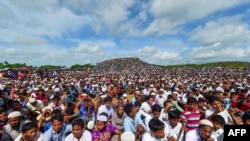On the third anniversary of a mass exodus of Rohingya to Bangladesh, prospects look bleak for about 1 million members of the Muslim minority from Myanmar living in bamboo and plastic shelters in refugee camps.
Two attempts to get a repatriation process going, in 2018 and 2019, failed as the refugees refused to go back to Buddhist-majority Myanmar, where they are denied citizenship and considered outsiders, fearing violence.
Some take the dangerous option of traveling with people-smugglers by boat to Southeast Asia. Scores of people have been killed in recent years as their over-crowded rickety boats have capsized or run out of water and food.
But even that perilous route is getting more difficult now as countries like Malaysia shut their borders, threatening to push boats back out to sea, to protect jobs and resources amid novel coronavirus lockdowns.
Some Rohingya are clinging to the hope of a third option - resettlement in a rich country.
"I just pray and hope that one day my family will be settled in a Western country," said Mohammed Nur, who lives in a refugee camp in Bangladesh's Cox's Bazar district neighboring Myanmar.
Nur was on a short-list for resettlement under an earlier program.
But Bangladesh, which has for decades given refuge to waves of Rohingya fleeing from Myanmar, ended the resettlement program in 2010 out of fear it would become a hub for refugees seeking to move to the West.
Nur lives in hope the program will be revived and has even put off marriage because he worries a bigger family would see him dropped from the list.
"I'm 29 now but still not married as I don't want to expand my family," he said.
Whether a resettlement program gets going or not depends on Bangladesh.
Bangladesh's refugee commissioner told Reuters the focus was on repatriation but his agency was ready to work to resettle refugees in other countries if his government decided to resume the program.
Talukder said it was up to the United Nations High Commissioner for Refugees (UNHCR) to request the resumption of resettlement, then his government would decide.
"If the government takes the decision, we're ready to implement it," the commissioner, Mahbub Alam Talukder, said.
From 2006 to 2010, the program saw 920 Rohingya resettled in countries such as Australia, Canada and the United States.
Bangladesh's foreign minister and the ministry's secretary did not respond to requests for comment.
'Third-country pathways'
The UNHCR said it was in "continuous dialog" with the Bangladesh government over the Rohingya.
"We continue to pursue durable solutions for the Rohingya refugees including repatriation in safety and dignity when conditions allow, as well as through third-country pathways for those with the most acute vulnerabilities, if this option becomes available," UNHCR spokeswoman Louise Donovan said.
Before the program was suspended, the UNHCR had identified about 1,000 people for relocation, based on medical grounds or for reasons of family reunifications.
The suspension left those people in limbo, some after they borrowed and even packed their bags in preparation for their move.
"We dreamt of a better life when we got selected to be resettled in the UK," said Mohammed Ismail, 32, who fled to Bangladesh when he was only eight. "But my poor luck, we never could fly."
Ismail and several others on the list with their families said they had heard nothing about the possibility of resettlement in recent years.
But even if Bangladesh were to agree to resume the program, it won't be easy for Rohingya to start new lives in the West.
H.T. Imam, a political adviser to Bangladesh's prime minister, has in the past called the resettlement process unrealistic because of the reluctance of European countries and the United States to take Muslim refugees.
He declined to comment when contacted by Reuters.
The UNHCR said globally resettlements had decreased significantly over the past few years, from a peak of more than 126,000 in 2016 that it was involved in, to about 64,000 last year.





